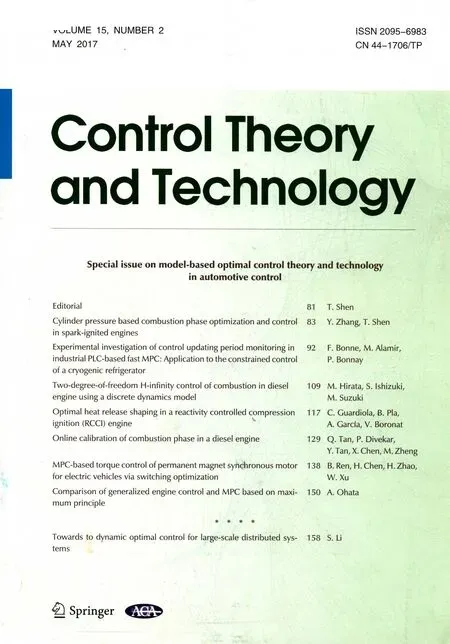Editorial
Editorial
Special issue on model-based optimal control theory and technology in automotive control
Optimality is one of fundamental pursuits of control engineers in control system design practice.Optimal control is never a new issue in control theory,however,it still attracts much attention in the research field of control theory,especially in control technology development,due to the difficulty in analytical optimal control law synthesis or numerical computing load in implementation.Meanwhile,in the past decades,electronization of automotive pow-ertrain control motivated on-board optimal control algorithm that targets high combustion efficiency and emission performance since complicated real-time control algorithm is enabled by the progress of ECU technology.This special issue focused mainly on recent researches in model-based optimal control of automotive engine and powertrain systems.
The seven contributions selected in this special issue represent a collection of optimal control application which are loosely linked to the issue of automotive engine and powertrain control,and the energy-use optimization with control technology.A common key word of this paper collection is model-based optimization but not all the control algorithm depending on the plant model.As shown in the paper by Yaihui Zhang,model-free extremal learning is also very significant methodology for aiming optimality in practice.The other papers included in this special issue are as follows.
The first paper by Fran¸cois Bonne et al.presents a PLC-based fast model-predictive control approach for cryogenic refrigerator.A precious contribution of this paper is that a complete industrial validation of the proposed optimal control strategy is provided and it should be noted that one of the authors,Professor Mazen Alamir,is very active in optimal control theory research.This is a good combination of theoretical research with industrial background.The second paper by Mitsuo Hirata demonstrated an application of typical robust control theory to diesel engines.A potential of the old H∞design to nonlinear system control with a linearized model is demonstrated in this paper.Carlos Guardiola et al.addressed a challenging issue of optimal heat release shaping in internal combustion engines.Very detailed experimental validation results show the potential for controlling combustion event in the engines.Combustion engine is a highly nonlinear system with stochasticity and uncertainties.The control of engine is usually performed with two phases,map-based calibration for static set-value and the dynamical control to guarantee the transient performance.The paper by Qingyuan Tan et al.proposed an online optimization algorithm for combustion phase calibration.Model-predictive control,so-called receding horizon optimization,is always an attractive topic in practical optimal control.The paper by Bingtao Ren et al.investigated model-based predictive control problem for electric vehicle-used motor.Finally,only one paper from industry provided a case study of model-predictive control of engines.The author Akira Ohata has long-time experience in Toyota automotive corporation.The opinion from technology development field will give us very fresh impact.
As summary,to control a dynamical system with optimality is still a challenging task in practical engineering.Modern automotive systems become to involve more and more control elements due to the rapid progress in ECU technology.The corrected papers just provide a cross section of on-going research in automotive engine and powertrain control.To inspire more advanced control technology in this active research field is the aim of this special issue.
Special thanks is extended to Yiguang Hong,Editor of Control Theory and Technology,for his timely organization of this special issue.Also,the guest editor wishes to thank the authors and the reviewers for their effort in submission and evaluation of the submissions.
©2017 South China University of Technology,Academy of Mathematics and Systems Science,CAS,and Springer-Verlag Berlin Heidelberg
Guest editor:
Tielong SHEN
Sophia University,Tokyo,Japan
 Control Theory and Technology2017年2期
Control Theory and Technology2017年2期
- Control Theory and Technology的其它文章
- Towards to dynamic optimal control for large-scale distributed systems
- Comparison of generalized engine control and MPC based on maximum principle
- MPC-based torque control of permanent magnet synchronous motor for electric vehicles via switching optimization
- Online calibration of combustion phase in a diesel engine
- Optimal heat release shaping in a reactivity controlled compression ignition(RCCI)engine
- Two-degree-of-freedom H-infinity control of combustion in diesel engine using a discrete dynamics model
